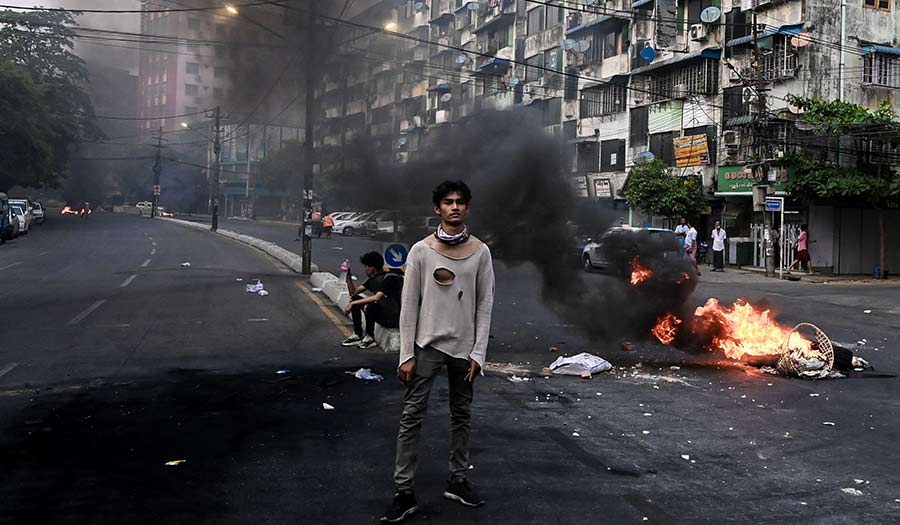 STR/AFP via Getty Images
STR/AFP via Getty Images
Article
As the Southeast Asian nation spirals into chaos, the international community ponders how or even whether to get involved.
Learn the why behind the headlines.
Subscribe to the Real Truth for FREE news and analysis.
Subscribe NowIt was not a typical Easter weekend in Yangon, Myanmar’s biggest city. As thousands of citizens pelted tanks and goose-stepping soldiers with bottles, rocks and Molotov cocktails—in protest of the military’s February 1 coup of the democratic government—others took to inscribing messages on Easter eggs.
“Spring Revolution,” “We must win” and “Get out MAH”—referring to military junta leader Min Aung Hlaing—were seen on eggs in social media photographs.
“Easter is all about the future and the people of Myanmar have a great future in a federal democracy,” Dr. Sasa, international envoy for the ousted civilian government, said in a statement.
Dr. Sasa, an honorific name for politician Salai Maung Taing San, is a member of a largely Christian ethnic minority in the predominantly Buddhist country with more than 130 religious and ethnic identities. Yet his statement represents the spirit driving Myanmar’s people to rally after they watched their fragile democracy seemingly disappear overnight.
Ever since the coup, when the military ousted the National League for Democracy and its popular leader Aung San Suu Kyi after claiming elections in November that resulted in a landslide victory were rigged, security forces have cracked down on dissent with brutality. At least 800 protesters and bystanders have been killed in less than three months.
Myanmar is no stranger to protests. During five decades of strict military rule, international isolation and sanctions, citizens have frequently vented their discontent in uprisings. This culminated in Ms. Suu Kyi’s rise to leadership in 2015 as generals loosened their grip.
But now that the people of Myanmar have had a taste of democratic freedoms over the past five years, it appears they are ready to fight for their very lives. “I don’t care if they shoot,” one protester told The New York Times, “because under the military, our lives will be dead anyway.”
As Myanmar’s people fight for their livelihoods, the nation is shutting down. Public services including internet have stopped and businesses paralyzed as soldiers sift through rebel areas killing at random. Protesters retaliate by burning down shops connected to the military. The months-long chaos is putting the nation’s very survival on the line, according to a chorus of pundits.
Foreign Affairs: “The country is not witnessing just another brutal setback to democracy but the creation in slow motion of a failed state in the vital heart of Asia.”
The Economist: “The New Afghanistan: Myanmar could be Asia’s next failed state”
The United Nations: The governing body’s special envoy for Myanmar warned that the country faces the possibility of civil war “at an unprecedented scale” and “is on the verge of spiraling into a failed state.”
All three sources urged some kind of foreign intervention.
“What is required is not complacency but urgency,” Foreign Affairs continued. “Major powers must set aside their instinctive geopolitical competition, and ASEAN [the Association of Southeast Asian Nations] should lead the international community to develop a coordinated policy that both appeals to and pressures the Tatmadaw [Myanmar’s national armed forces] to end the carnage and help put Myanmar back on the democratic track its people demand.”
And the subtitle of the Economist article: “Only its neighbours can help put the country on a better path.”
The UN special envoy implored the UN Security Council to consider “potentially significant action” to reverse the military coup to restore democracy.
But what this “significant action” entails is unclear—and both neighboring nations and democratic bastions including the United States are not ready to square off with a military governing system that has been in power since the 1940s.
Plus, foreign intervention by democratic forces rarely goes as planned. Think of Afghanistan—where the U.S. plans to pull out its troops after 20 years of a stalemate war against the Taliban.
Myanmar will need a precise kind of intervention that assures both its survival and prosperity of its citizens.
Drawing the Line
While most analysts say intervention is necessary to save Myanmar, there is no clear agreement on how that would be accomplished.
So far, regional players have pulled most of the weight. Southeast Asian countries have considered a proposal to send a humanitarian aid mission to Myanmar as a potential first step in a long-term plan to broker dialogue between the junta and its opponents.
ASEAN—worried by the bloodshed in a nation that faces economic collapse, mass civil disobedience and the resurgence of conflict between the military and ethnic groups—have stepped up diplomatic efforts since the coup. Myanmar is a member of the 10-member ASEAN, and the bloc’s mediation could be key to resolving the crisis.
Still, the UN has called for a coordinated global effort driven by the U.S., United Kingdom and European Union. What can these democratic powerhouses do?
Sanctions have been ineffective. Myanmar’s military has managed to flourish despite decades of sanctions from the West. The junta benefits from investments in the gem-trade, the nation produces 70 percent of the world’s jade, and uses this revenue stream to purchase military equipment from China and Russia.
“But while the West, most notably the US, has been keen to take the lead in imposing sanctions, Myanmar’s biggest trade partners in Asia have rejected that approach,” BBC News reported.
“Critics worry that the uneven pressure won’t be enough to force change.”
“The leverage is not really there,” Richard Horsey, a Myanmar expert with the International Crisis Group, told the news outlet.
There are also potential unintended consequences from sanctions, where citizens pay the price for economic penalties. For example, the U.S. State Department estimated that a 2003 ban on Burmese textile imports eliminated up to 60,000 jobs.
The UN’s options for Myanmar boil down to “two possibilities,” the Asia-news-centric Diplomat stated.
“The junta remains in power and consolidates its rule through a rigged election, or the junta is overthrown and the military is forced to return to its barracks for good. On the one hand, this simplifies the options. On the other, it complicates things for the international community, parts of which, not least the Southeast Asia bloc (ASEAN), were hoping that a compromise could be found around the negotiation table. Now, the international community must either accept the junta or work toward its downfall.”
Full-scale military intervention is historically fraught with failure. Harvard’s Belfer Center noted a paradox with Western intervention: “Policymakers weighing foreign-imposed regime change as a path to democracy in foreign states face a paradox: weak or poor states are the most vulnerable to imposed regime change, but are also the least likely to democratize following intervention.”
“The war in Iraq, for example, resulted in approximately 4,500 U.S. military fatalities and over 100,000 Iraqi civilian deaths (according to conservative estimates), at an estimated financial cost of over $4.5 trillion, including the cost of funding military operations, interest payments on the debt incurred, and long-term medical care for injured veterans. Yet after a decade of war, these efforts have produced little democratic progress: according to measures such as Freedom House’s Freedom in the World survey, Iraq is barely more democratic than it was prior to the 2003 invasion.”
For the West, setting up a unified democracy in a nation composed of competing Muslim groups—Shiite and Sunni—proved an impossible task. Now imagine wading into Myanmar, a state with more than 130 ethnicities and religious groups from Christian to Muslim to Buddhist!
Yet failing to intervene and letting the southeast Asian people save themselves could prove even more devastating. The think tank Brookings Institution observed that the “unintended consequences” of the Arab Spring, for example, was that “peaceful protests in middle-income countries [led] to sectarian conflict and violent civil wars.”
Left alone, the situation in Myanmar would likely be the same.
Coming Intervention
“A bloodbath is imminent” if the coup is not reversed in Myanmar, the UN special envoy to the nation warned.
Sadly, Myanmar is not the only hotbed of violence in the world. Sectarian violence is exploding. Think of loyalists versus separatists in Northern Ireland—mounting tensions between Ukraine and Russia—even racial violence within the U.S.
As we all watch these tragic events unfold, we can feel like the prophet Habakkuk in the Old Testament: “O Lord, how long shall I cry, and You will not hear! Even cry out unto You of violence, and You will not save!” (1:2).
Habakkuk was describing what he saw in a vision—harrowing bloodbaths that could describe Myanmar today. “For spoiling and violence are before me: and there are that raise up strife and contention” (vs. 3).
Some of these conditions God displayed to the prophet are a result of ethnic conflict also prophesied to occur. Jesus Christ spoke of a time when “nation shall rise against nation” (Matt. 24:7). The term “nation” in this passage is from the Greek word “ethnos,” which refers to ethnic groups.
In other words, there would come a time when differing ethnicities would clash like never before. This is happening today, and Myanmar is just one tragic example.
Yet God answered Habakkuk’s question. When we see the terrible conditions of today—brought on by thousands of years of mankind attempting to rule itself—it means something else is close. God replied: “Behold you…and regard, and wonder marvelously: for I will work a work in your days, which you will not believe, though it be told you” (1:5).
This marvelous work—by God’s own hands—will be the greatest intervention in world affairs of all time. It seems unbelievable, and many scoff at it, but it is really going to happen.
When Jesus Christ came to Earth 2,000 years ago, He urged everyone to “believe the gospel” (Mark 1:15). Gospel simply means “good news.”
What is that good news? Read Christ’s full statement to the public: “The time is fulfilled, and the kingdom of God is at hand: repent you, and believe the gospel.”
The Kingdom of God is the good news—the unbelievably good news sorely needed in a world succumbing to ethnic division and more bloodbaths. God’s ultimate work is to set up His Kingdom, a world-ruling supergovernment that will end strife, foster unity, and heal all peoples.
This will be the intervention Myanmar desperately needs, as does the entire world.
You have been told the incredible promise of what is coming to end mankind’s insoluble problems. But, “though it be told you,” will you “believe”?
Our booklet What Is the Kingdom of God? explains in detail God’s soon-coming awesome, wonderful work.
More on Related Topics:
- The Last U.S.-Russian Nuclear Pact Is About to Expire, Ending a Half-Century of Arms Control
- Explainer: What Is President Trump’s ‘Board of Peace’ and Who Has Joined So Far?
- China and Japan, Uneasy Neighbors in East Asia, Are at Odds Again
- Is Peace in Ukraine Any Closer After Trump-Zelenskyy Talks?
- Explainer: Why Is Fate of Donetsk Region a Sticking Point in Talks on Ending War in Ukraine?



